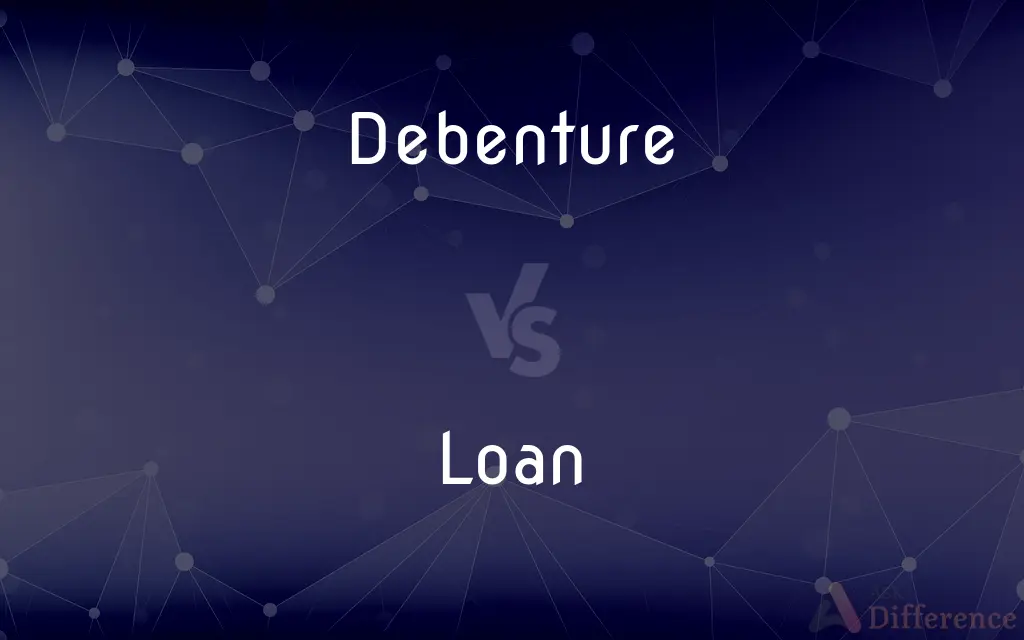Debenture vs. Loan — What's the Difference?
Edited by Tayyaba Rehman — By Fiza Rafique — Updated on April 15, 2024
Debentures are long-term securities issued by companies to borrow money, relying on creditworthiness without collateral; loans are broader financial arrangements that can be secured or unsecured, and are provided by various lenders.

Difference Between Debenture and Loan
Table of Contents
ADVERTISEMENT
Key Differences
Debentures are a form of long-term financing issued by corporations to raise capital, backed only by the general creditworthiness and reputation of the issuer. In contrast, loans are financial sums that can be borrowed from banks, financial institutions, or individuals, and may require collateral depending on the agreement and the lender's policies.
Debentures typically involve fixed interest rates and have set maturity dates when the principal must be repaid. Loans, however, can have either fixed or variable interest rates and the terms of repayment can vary widely, including the possibility of amortization over a period or a lump sum repayment.
Issuers of debentures are usually corporations, and the instruments are used to raise investment capital by issuing debt securities. On the other hand, loans can be taken out by individuals, businesses, governments, or any entity needing funds, from financial institutions or private lenders.
Debentures do not confer any ownership rights to the holders; they merely represent a debt obligation. Loans, however, especially those taken by shareholders in businesses, can sometimes lead to a stake in the company if converted into equity or if stipulated in the loan terms.
The interest paid on debentures is generally a charge against profit, which means it is deducted before tax. Whereas, the interest expense on loans is also deducted before tax, but the handling and implications can vary depending on the borrower’s financial structure and the type of loan.
ADVERTISEMENT
Comparison Chart
Nature
Unsecured; backed by trust and creditworthiness
Secured or unsecured; terms vary
Issued By
Corporations
Banks, financial institutions, private lenders
Interest Rates
Usually fixed
Fixed or variable
Repayment Terms
Fixed maturity date
Flexible; can be structured in various ways
Rights Conferred
No ownership rights
May confer ownership if conditions met
Compare with Definitions
Debenture
Bonds issued by companies to raise money with fixed interest rates.
The debentures offered by the company carried a 5% interest rate.
Loan
A lending agreement between a borrower and a lender.
The loan agreement specified monthly repayments over fifteen years.
Debenture
A long-term security issued by a company based on its general creditworthiness without collateral.
The corporation issued debentures to finance its new manufacturing plant.
Loan
Can be secured by collateral or unsecured based on borrower's creditworthiness.
His good credit score allowed him to get the loan without collateral.
Debenture
An unsecured loan part of a company’s debt capital.
The debentures formed a significant part of the company's capital structure.
Loan
The act of giving money temporarily on the condition that it or its equivalent will be returned, often with an interest fee.
The bank approved the business loan after a thorough review of the company’s financials.
Debenture
A debt instrument not secured by physical assets or collateral.
Investors bought the debentures knowing they were backed only by the issuer's reputation.
Loan
A sum of money borrowed that is expected to be paid back with interest.
She took out a loan to pay for her education.
Debenture
A corporate bond that usually involves regular interest payments and a principal repayment at maturity.
The debenture holders were assured of their interest payments annually.
Loan
Money borrowed to be repaid under terms set between the borrower and lender.
The car loan had a variable interest rate tied to the market index.
Debenture
In corporate finance, a debenture is a medium- to long-term debt instrument used by large companies to borrow money, at a fixed rate of interest. The legal term "debenture" originally referred to a document that either creates a debt or acknowledges it, but in some countries the term is now used interchangeably with bond, loan stock or note.
Loan
In finance, a loan is the lending of money by one or more individuals, organizations, or other entities to other individuals, organizations etc. The recipient (i.e., the borrower) incurs a debt and is usually liable to pay interest on that debt until it is repaid as well as to repay the principal amount borrowed.
Debenture
A certificate or voucher acknowledging a debt.
Loan
An instance of lending
A bank that makes loans to small businesses.
Debenture
An unsecured bond issued by a civil or governmental corporation or agency and backed only by the credit standing of the issuer.
Loan
A sum of money that is lent, usually with an interest fee
Took out a loan to buy a car.
Repaid the loan over five years.
Debenture
A customhouse certificate providing for the payment of a drawback.
Loan
The agreement or contract specifying the terms and conditions of the repayment of such a sum.
Debenture
A certificate that certifies an amount of money owed to someone; a certificate of indebtedness.
Loan
The repayment obligation associated with such an agreement
She couldn't afford the loan after losing her job.
Debenture
(obsolete) A certificate of a loan made to the government; a government bond.
Loan
The right to payment associated with such an agreement
A bank that buys consumer loans.
Debenture
A type of debt instrument secured only by the general credit or promise to pay of the issuer, not involving any physical assets or collateral, now commonly issued by large, well established corporations with adequate credit ratings.
Loan
The state of being lent for temporary use
A painting on loan from another museum.
Debenture
A document granting lenders a charge over a borrower’s physical assets, giving them a means to collect a debt, as part of a secured loan.
Loan
To lend (money or property).
Debenture
A writing acknowledging a debt; a writing or certificate signed by a public officer, as evidence of a debt due to some person; the sum thus due.
Loan
An act or instance of lending, an act or instance of granting something for temporary use.
Because of the loan that John made to me, I was able to pay my tuition for the upcoming semester.
Debenture
A customhouse certificate entitling an exporter of imported goods to a drawback of duties paid on their importation.
Loan
A sum of money or other property that a natural or legal person borrows from another with the condition that it be returned or repaid over time or at a later date (sometimes with interest).
All loans from the library, whether books or audio material, must be returned within two weeks.
He got a loan of five thousand pounds.
Debenture
Any of various instruments issued, esp. by corporations, as evidences of debt. Such instruments (often called debenture bonds) are generally, through not necessarily, under seal, and are usually secured by a mortgage or other charge upon property; they may be registered or unregistered. A debenture secured by a mortgage on specific property is called a mortgage debenture; one secured by a floating charge (which see), a floating debenture; one not secured by any charge a naked debenture. In general the term debenture in British usage designates any security issued by companies other than their shares, including, therefore, what are in the United States commonly called bonds. When used in the United States debenture generally designates an instrument secured by a floating charge junior to other charges secured by fixed mortgages, or, specif., one of a series of securities secured by a group of securities held in trust for the benefit of the debenture holders.
Loan
The contract and array of legal or ethical obligations surrounding a loan.
He made a payment on his loan.
Debenture
A bond that is backed by the credit of the issuer but not by any specific collateral
Loan
The permission to borrow any item.
Thank you for the loan of your lawn mower.
Debenture
A certificate or voucher acknowledging a debt
Loan
(Scotland) A lonnen.
Loan
To lend (something) to (someone).
Loan
A loanin.
Loan
The act of lending; a lending; permission to use; as, the loan of a book, money, services.
Loan
That which one lends or borrows, especially a sum of money lent at interest; as, he repaid the loan.
Loan
To lend; - sometimes with out.
By way of location or loaning them out.
Loan
The temporary provision of money (usually at interest)
Loan
A word borrowed from another language; e.g. `blitz' is a German word borrowed into modern English
Loan
Give temporarily; let have for a limited time;
I will lend you my car
Loan me some money
Common Curiosities
What is a debenture?
A debenture is a type of debt instrument unsecured by collateral, issued by companies based on creditworthiness.
How does a loan differ from other credit facilities?
A loan is a specific agreement where money is borrowed and expected to be paid back with interest, under agreed terms.
Are all loans secured?
No, loans can either be secured or unsecured.
Do debentures offer variable interest rates?
Typically, debentures have fixed interest rates, unlike some types of loans that can have variable rates.
How do corporations benefit from issuing debentures?
Corporations benefit from debentures by securing necessary capital without diluting ownership through equity.
What risks are associated with buying debentures?
Since debentures are unsecured, the main risk involves the issuing company’s potential default.
What happens at the maturity of a debenture?
At maturity, the principal amount of the debenture must be repaid to the investors.
Can individuals issue debentures?
No, debentures are typically issued by corporations to raise capital.
How are loan interest rates determined?
Loan interest rates are typically determined based on the borrower’s credit risk, market conditions, and the loan’s duration.
What is collateral, and how is it related to loans?
Collateral is an asset pledged as security for repayment of a loan, forfeited in the event of a default.
What is the typical duration of a loan?
The duration of a loan can vary greatly, from short-term loans of a few months to long-term loans extending over several years.
How can an individual acquire a debenture?
Individuals can purchase debentures through investment markets or directly during corporate issues.
Do debenture holders have voting rights in the company?
No, debenture holders do not have voting rights as they are creditors, not shareholders.
Can debentures be converted into equity?
Some debentures, known as convertible debentures, can be converted into equity shares as per the terms specified.
What are the tax implications of interest paid on loans and debentures?
Interest expenses on both loans and debentures are generally tax-deductible for the payer.
Share Your Discovery

Previous Comparison
Christianism vs. Christianity
Next Comparison
Dog vs. CoyoteAuthor Spotlight
Written by
Fiza RafiqueFiza Rafique is a skilled content writer at AskDifference.com, where she meticulously refines and enhances written pieces. Drawing from her vast editorial expertise, Fiza ensures clarity, accuracy, and precision in every article. Passionate about language, she continually seeks to elevate the quality of content for readers worldwide.
Edited by
Tayyaba RehmanTayyaba Rehman is a distinguished writer, currently serving as a primary contributor to askdifference.com. As a researcher in semantics and etymology, Tayyaba's passion for the complexity of languages and their distinctions has found a perfect home on the platform. Tayyaba delves into the intricacies of language, distinguishing between commonly confused words and phrases, thereby providing clarity for readers worldwide.














































